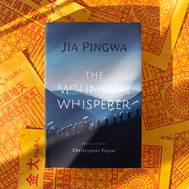April 2021: Jia Pingwa 贾平凹
 Jia Pingwa (1952- ) stands with Mo Yan and Yu Hua as one of the biggest names in contemporary Chinese literature. A prolific producer of novels, short stories and essays, he has a huge following on the Chinese mainland, as well as in Hong Kong and Taiwan. An early English translation of his 1988 novel Turbulence by Howard Goldblatt won the Mobil Pegasus Prize for Literature. In 1997, his 1993 bestseller Ruined City was first published abroad in French as La Capitale déchue (Abandoned Capital), translated by Genevieve Imbot-Bichet. It was published in English translation in January 2016, again by Howard Goldblatt, this time as part of the Chinese Literature Today Book Series. Happy Dreams, translated by Nicky Harman, and The Lantern Bearer, translated by Carlos Rojas, were published in 2017.
Jia Pingwa (1952- ) stands with Mo Yan and Yu Hua as one of the biggest names in contemporary Chinese literature. A prolific producer of novels, short stories and essays, he has a huge following on the Chinese mainland, as well as in Hong Kong and Taiwan. An early English translation of his 1988 novel Turbulence by Howard Goldblatt won the Mobil Pegasus Prize for Literature. In 1997, his 1993 bestseller Ruined City was first published abroad in French as La Capitale déchue (Abandoned Capital), translated by Genevieve Imbot-Bichet. It was published in English translation in January 2016, again by Howard Goldblatt, this time as part of the Chinese Literature Today Book Series. Happy Dreams, translated by Nicky Harman, and The Lantern Bearer, translated by Carlos Rojas, were published in 2017.
Jia Pingwa’s fiction focuses on the lives of common people, particularly in his home province of Shaanxi, and is well-known for being unafraid to explore the realm of the sexual. Ruined City was banned for many years for that same reason, and pirated copies sold on the street for several thousand yuan apiece. The novel was finally unbanned in 2009, one year after Jia won the Mao Dun Award for his 2005 novel Shaanxi Opera.
Bio from Sinoist Books
 This month we're featuring something a little different - rather than a story we have the Afterword to Jia Pingwa's novel The Mountain Whisperer, to be published soon by Sinoist Books in a translation by Christopher Payne. You can read it in translation here, and in the original Chinese here.
This month we're featuring something a little different - rather than a story we have the Afterword to Jia Pingwa's novel The Mountain Whisperer, to be published soon by Sinoist Books in a translation by Christopher Payne. You can read it in translation here, and in the original Chinese here.
About the book:
In a cave high in the ageless mountains of China’s desolate interior, an ancient funeral singer awaits the end. From his deathbed he gives voice to the generations of villagers to whom he devoted his life’s work, and four all-too-human souls whose struggles defined an era.
A soldier, a peasant, a revolutionary and a politician. When revolt and reform take hold of the wartorn plains, all play their debased roles in the mythic cycle of avarice, vengeance and suffering.
As his four tragedies interweave, the cracked lips of the dying sage conjure a stark vision: a retelling of the forging of the People’s Republic – from turbulent birth to absurd reversal – whispered from its uncharted margins.
Sinoist Books also held a special online event with Jia Pingwa recently, led by translator Christopher Payne. You can catch up with it on Youtube here.
You also can find more information on Paper Republic, including a link to an interesting documentary on Jia (in Chinese with Chinese subtitles) by director Jia Zhangke (2019).
